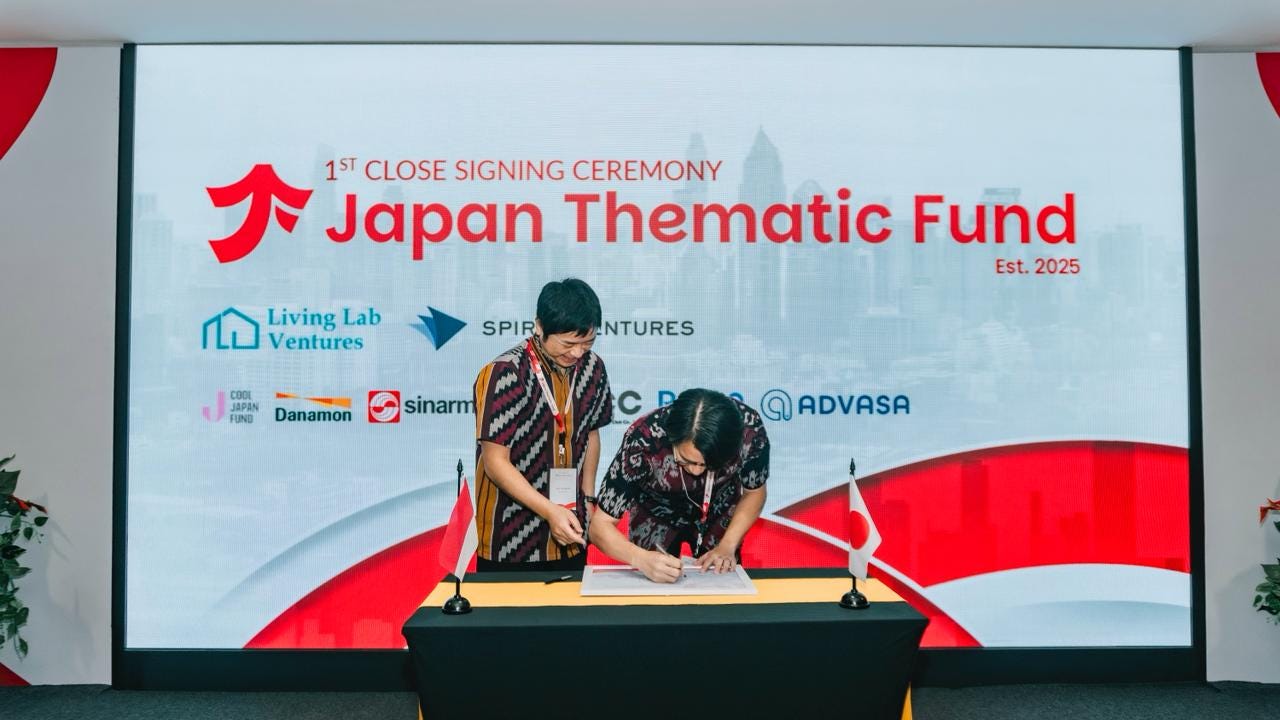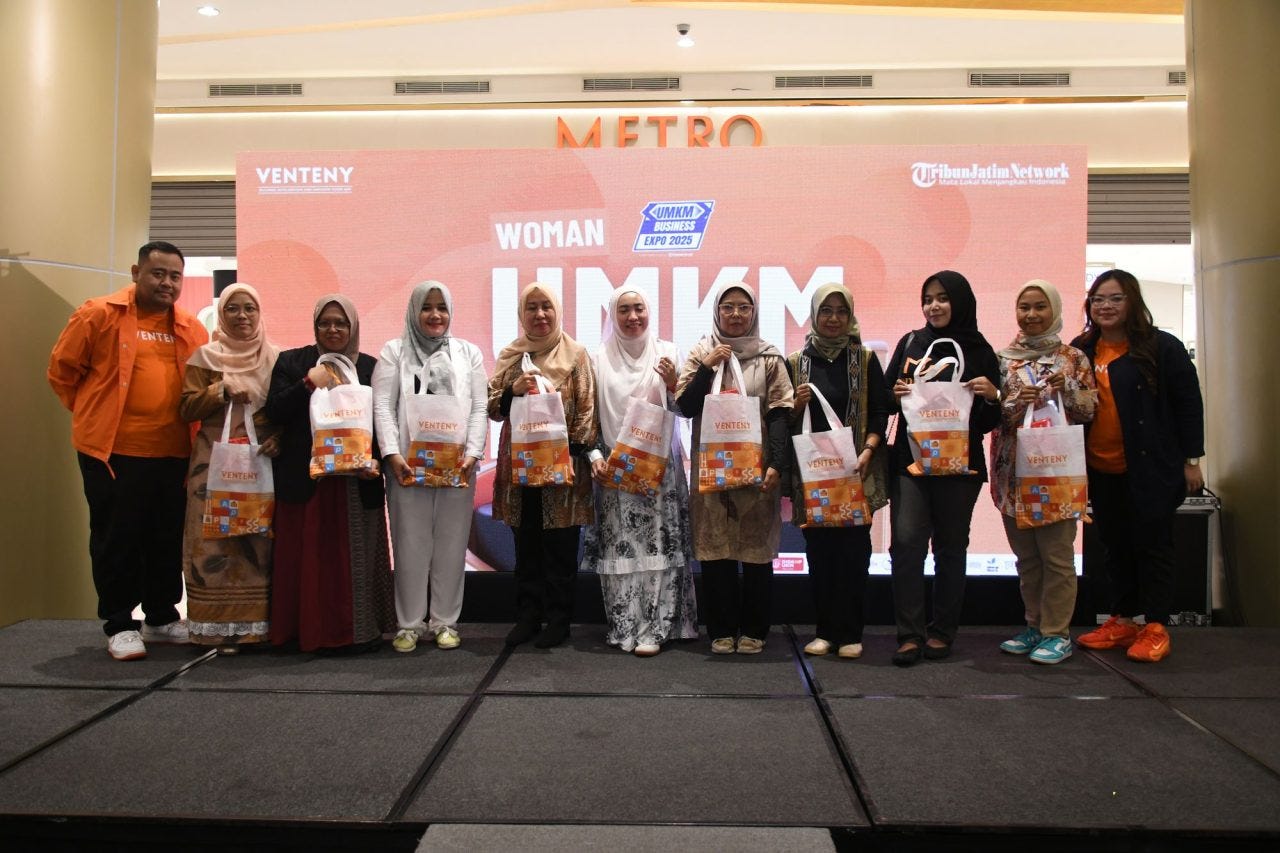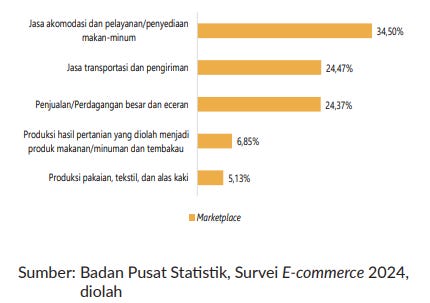Living Lab Ventures doubles down on innovation 🇯🇵, Grab posts profits 💰, Indonesia’s online spending rising 🛍️
Dear subscriber,
The past week have brought a wave of momentum across Indonesia’s innovation and digital economy. New cross-border partnerships and funding—from Living Lab Ventures’ Japan Thematic Fund to VENTENY’s social-impact investments—highlight how collaboration and purpose are shaping the next phase of growth. At the same time, companies like Grab, Blibli, and Telkomsel are proving that scale and technology remain central to market leadership, from profitability milestones to AI integration. The fintech, e-commerce, and digital infrastructure sectors continue to attract global attention, while online consumption shows no signs of slowing—BPS reported a 6.19% rise in e-commerce spending in Q3, with record-breaking campaigns already setting the tone for year-end optimism.
Best regards,
The DailySocial Team
What’s New
1. Living Lab Ventures launches Japan‐Thematic Fund
Living Lab Ventures, based in Indonesia, has launched a new “Japan Thematic Fund” in partnership with Japan’s Cool Japan Fund and other backers. The fund is designed to help startups from Japan and Southeast Asia access capital, cross-border business connections, and real-world trial opportunities. For the Indonesian market this means more chances for local ventures to link up with Japanese firms, transfer technology, and expand beyond domestic boundaries.
2. Grab Holdings posts strong Q3 2025 revenue growth
Grab recorded Q3 2025 revenue of US$873 million, a 22% increase from last year, marking another profitable quarter with US$17 million in net profit. Growth was fueled by strong demand across its ecosystem — on-demand services rose 24%, deliveries jumped 23% to US$465 million, and financial services surged 39%. The company also achieved US$136 million in adjusted EBITDA, up 51% year-on-year, supported by steady operational efficiency. With US$7.4 billion in cash reserves, Grab continues to strengthen its position as one of Southeast Asia’s leading digital platforms, reflecting the region’s growing reliance on ride-hailing, delivery, and payment services.
3. Grab–GoTo Merger Talks: State Palace Confirms Negotiations
Indonesia’s State Secretary Minister Prasetyo Hadi confirmed that Grab and GoTo are in the process of negotiating a potential merger, which could lead to the creation of a single entity combining both platforms. The state-owned investment management agency Danantara is reportedly involved in the discussions to oversee the corporate asset arrangements. The merger plan is also being reviewed as part of a draft Presidential Regulation that will set clearer rules on the status, protection, and fare structure for online drivers and delivery partners.
4. VENTENY Secures Dual Funding to Advance Financial Inclusion and Women’s Empowerment
VENTENY Fortuna International (VTNY) has secured two new funding rounds to strengthen its mission of promoting financial inclusion and worker welfare in Indonesia. The company received US$5.5 million from the Women’s Livelihood Bond 7 (WLB7), managed by Impact Investment Exchange (IIX), to expand working-capital financing for women-led MSMEs in underserved regions. Around the same time, VENTENY also gained strategic investment from Japan’s Better Place Co. Ltd., aimed at enhancing its B2B financing services and employee well-being programs through the VENTENY Employee Super App. With this support, the company plans to scale up financing for MSMEs, improve employee wellness benefits, and build a more inclusive and sustainable business ecosystem.
5. Living Lab Ventures Invests in INCREASE to Strengthen Indonesia’s Clinical Research Ecosystem
Living Lab Ventures (LLV), the corporate venture arm of Sinar Mas Land, has made a strategic investment in INCREASE Laboratorium Indonesia, a clinical research and laboratory services company based in BSD City. The funding will help INCREASE expand operations, build global partnerships, and obtain international certifications such as CAP and ISO standards. INCREASE already works with partners in Singapore, Australia, China, and Japan, including Tsinghua University and Osaka University, to advance technology transfer and local talent development.
What’s Exciting
1. Telkom Indonesia earns from data-centre business with high utilisation
Telkom Indonesia’s subsidiary has reported strong demand in its data-centre business, with utilisation reaching 89 % in the third quarter. Although revenue was slightly down compared to the year before, the high utilisation suggests robust growth potential for Indonesia’s digital infrastructure sector. It offers local companies opportunities in services, infrastructure, partnerships and talent development.
2. YouTube Festival 2025 proclaims Indonesia as growth hub
YouTube’s Festival 2025 has declared Indonesia as its next growth centre, recognising the large audience, creator ecosystem and market potential. For Indonesia this is significant: it underlines that digital content creation, influencers, video marketing and creator economy are sectors to watch and invest in. It creates new opportunities for local talent, brands and platforms to tap into global attention from within Indonesia. The festival’s focus may also bring more tools, initiatives and partnerships for Indonesian creators.
3. Xendit appoints former JPMorgan executive to boost growth
Southeast Asian fintech leader Xendit has appointed a former JP Morgan executive as its Chief Revenue Officer, marking a key move to accelerate growth across Indonesia, the Philippines, and regional markets. The new executive brings deep experience in global finance and revenue strategy, which will help the company expand partnerships with banks and enterprises. This leadership change comes amid rapid fintech growth in Southeast Asia, as digital adoption and e-commerce continue to rise.
4. CloudMile raises US$20 million to expand AI footprint in Southeast Asia
CloudMile, a Taiwan-based AI firm, has raised US$20 million to expand its cloud and AI services across Southeast Asia, including Indonesia. It suggests local businesses may gain access to more advanced AI tools, infrastructure and partnerships. As Indonesia further embraces digitalisation, such regional initiatives can accelerate the pace of adoption.
5. Lazada invests US$25 million for 11.11 programme in Southeast Asia
Lazada has committed US$25 million to its 11.11 shopping campaign across Southeast Asia, which includes Indonesia. This signals a strong push into e-commerce growth and consumer engagement in the region. For Indonesia, a large market for online shopping, this kind of investment boosts promotional activity, brand presence and competition — which may bring benefits for consumers and merchants alike. It also indicates confidence from global platforms in Indonesia’s e-commerce potential.
6. Influencer regulation under study by Kominfo (Indonesia’s Ministry of Communication & Informatics)
Indonesia is exploring the idea of certifying influencers—similar to what China has done—as the influencer economy grows rapidly. The potential regulation could bring more professionalism, transparency and structure to the creator economy. It may also mean new opportunities for training, certification, compliance and value-added services for influencers, which could attract brand partnerships and investment. At the same time, it signals that the regulator is taking the creator economy seriously as part of digital economy policy.
7. LG CNS launches a cloud ERP project in Indonesia
LG CNS, a global IT services firm, is implementing a cloud ERP project in Indonesia as part of its global expansion. This shows global tech firms recognise Indonesia as a viable market for enterprise software and digital transformation. For Indonesian businesses, it means improved access to advanced enterprise tools, better cloud adoption and potentially stronger local IT services ecosystems. It highlights Indonesia as a location for investment and partnership in enterprise-software infrastructure.
8. Telkomsel pairs with ChatGPT‑pro to bundle services targeting half of Indonesian mobile users
Telkomsel has partnered with OpenAI to launch the Telkomsel × ChatGPT Go bundle, marking OpenAI’s first collaboration in Southeast Asia. The promo targets around 157 million users, offering special data packages and access to ChatGPT Go, OpenAI’s new affordable subscription tier. Priced from Rp 50,000, users get data quotas dedicated to ChatGPT plus subscription access for up to two months through the MyTelkomsel app or Telkomsel Poin redemption. Telkomsel said the initiative reflects its push to become a “digital lifestyle enabler,” while OpenAI highlighted Indonesia as a key entry point for expanding AI adoption across the region.
Whats next
Online Shopping Grows 6.19% in Q3, Boosted by Discount Campaigns
Indonesia’s online spending continued to rise in the third quarter of 2025, with Badan Pusat Statistik (BPS) reporting a 6.19% quarter-on-quarter growth in e-commerce transactions. Bank Indonesia recorded total e-commerce value reaching Rp 134.7 trillion, up 4.93% from Q2 and 3.74% year-on-year, while transaction volume climbed 7.72% quarterly to 1.44 billion. The growth was driven by major discount events such as 7.7, 8.8, and 9.9, signaling strong consumer participation across platforms including Tokopedia, Shopee, Lazada, and TikTok Shop ahead of the highly anticipated 11.11 campaign.
Top-Selling Commodities on Marketplaces
Data from Tokopedia and TikTok Shop showed strong performance during the 10.10 sale period, with sellers increasing by 46.8% and average orders rising 45%. Popular categories included electronics and automotive products (+75.5%), food and beverages (+58.4%), and beauty and personal care. Interestingly, the fastest growth came from Eastern Indonesia, notably Papua Barat, Gorontalo, Maluku, and Sulawesi Tenggara, showing that e-commerce penetration is expanding beyond Java. This broad-based participation reflects how digital platforms are deepening access to commerce and boosting regional economies.
Consumption Remains Steady Amid Seasonal Shifts
While overall household consumption growth slightly eased in Q3 due to the absence of major holidays, BPS noted that domestic demand remains strong, led by spending on personal care (17–18%), home goods (14%), and transport and recreation (13%). Officials emphasized that the slowdown is seasonal, not a sign of weakening purchasing power. With disposable income and optimism holding up, Indonesia’s digital economy continues to benefit from resilient household consumption and nationwide enthusiasm for online retail.



